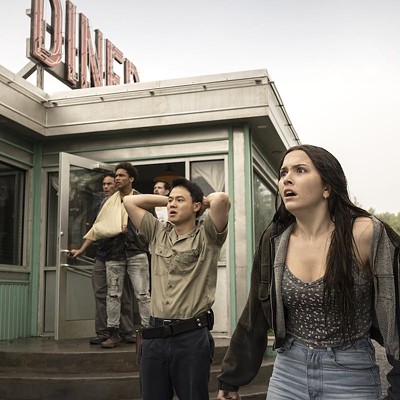Michael Bay has haunted me since 1998. I was working at Sears, and a male colleague informed me I had no heart for not crying at the end of Armageddon. Though Bay's the one whose heart should be in question, his often infuriating body of work displays unquestionable skill.
His sun-drenched compositions, silhouetted men in uniform, hot girls, classic rock, big machines and flag-waving display an authorship many would rather ignore. Bay's beer-commercial-filtered view of the world gives him a take on Americana as distinctive as Norman Rockwell's. Transformers is his ultimate movie expression. It's also the first summer blockbuster to make it feel like the summertime.
The Hasbro toy line gives Bay a spine for his pre-occupation with men co-existing with machines. Those multi-million-dollar robot effects are his grown-up action figures. This thin line between war and play (how technology fulfills adults with the same creative and destructive urges of kids playing with toys) is a crucial point of interest. It mandates reducing the Transformers to secondary characters after the humans. If the producers had guts, the movie would be titled Michael Bay's America.
At heart, Transformers is a love story between a kid and his car—a reconsidering of the human-alien bond in ET. Now it's a friendship based in capitalist accessory. This isn't darkly observed, like the character Arnie losing his mind for his Plymouth Fury in John Carpenter's Christine. Sam's (Shia LaBeouf) attachment to his first car, a used yellow Camaro, helps give him his dignity. Already perturbed that the car drives on its own, it then changes into a giant robot named Bumblebee, and informs Sam of a fight for the fate of humanity against archenemies the Decepticons.
This first hour evokes the suburban youth conventions of 1980s Spielberg productions. And when Sam's new robot friends hide against the outside walls of his parents' home, it recalls the kid finding a T-Rex in his backyard in The Lost World. Were the awkward parent and peer dynamics handled with less wit, this would be derivative. Contrary to popular criticism, Transformers' human dialogue is quite funny. Only the robots' speech is stiff in its effort to conform to the '80s cartoon.
Because Michael Bay is emotionally undeveloped, there's purity to the film's childish reason. Transformers is a boy's fantasy, and demands to be seen as such. It's a movie where the central human arc is that a geeky kid gets a car, gets a chick and becomes a tough hero. That's funny, because of what's so wrong with it: the pubescent fantasies about heroism and vindication are dead on. A scene where the robot Bonecrusher tackles Optimus Prime on a freeway has the Transformers looking like football players. Yet by never allowing the action scenes a frightening impact, the lighthearted approach holds Transformers from its true potential. The visuals are amazing in ways that go beyond a lot of dollars thrown at effect houses; there's imagination to the way these objects move and feel. But having people react as though it's just another day in the USA as buildings explode and alien machines throw them around doesn't adequately deepen childhood imagination with world dread.
Michael Bay isn't someone who naturally thinks in small terms. Indulging in the playground of technology at his disposal, Bay makes Transformers' hugeness personal. Two thousand seven finally gets a purely enjoyable megamovie.
For showtimes click here. Indulge in the technology. Write: [email protected]












